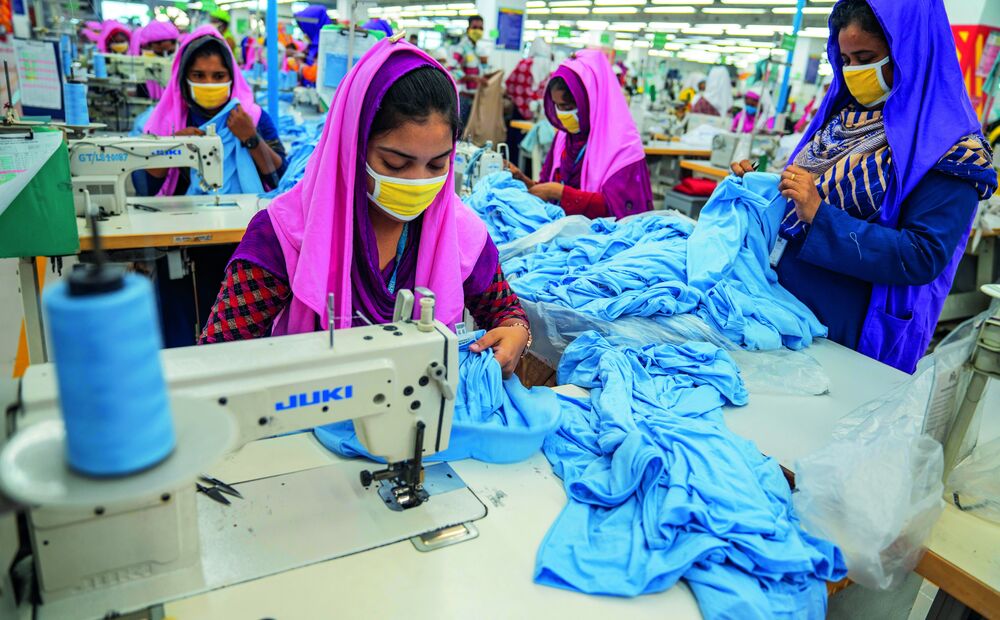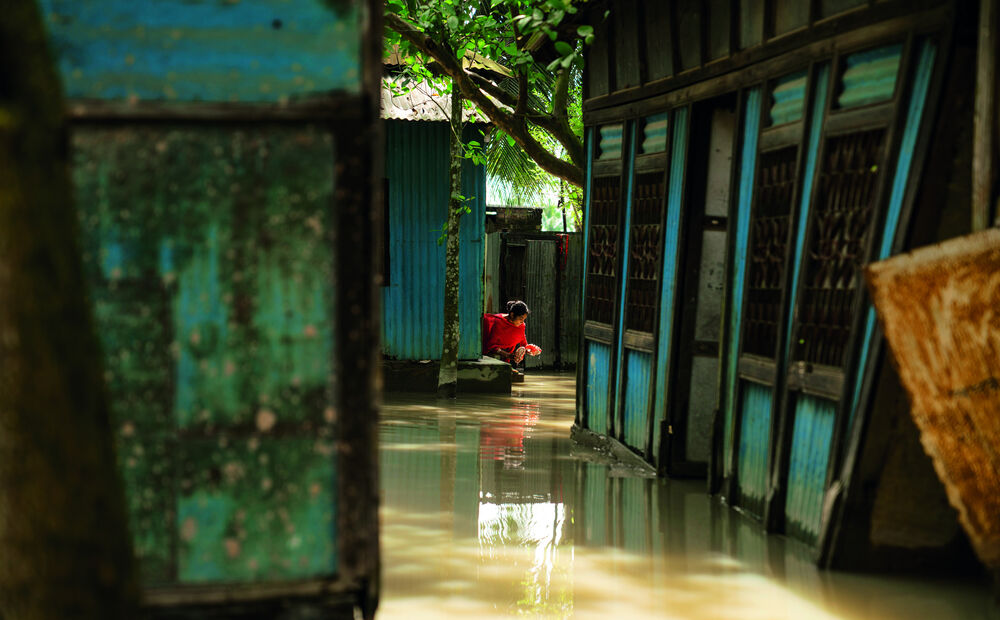All of us own at least one item of clothing from Bangladesh – a pair of socks, trousers, a dress, a T-shirt, or maybe a towel. The country has become the second-biggest textile exporter in the world; clothing stores in Germany obtain between 30 % and 50 % of their merchandise from Bangladesh. Just imagine fashion houses without products from Bangladesh – they'd be half empty! Each of us buys an average of 60 items of clothing a year – that's twice as many as 20 years ago, and rising. We may buy twice as much, but we spend only 0.1 % more. How come that works? Due to manufacturing conditions that are often inhumane and anything but eco-friendly.


Let's just trace the typical production process for a cheap T-shirt that can be bought in Germany for a few euros. It begins of course with cotton growing, the biggest producing countries being India, China, the USA, and Turkey. Regrettably, working conditions in the cotton fields are not always humane. The farms are often contaminated with pesticides – around 16 % of the insecticides used worldwide are sprayed on cotton fields. Water consumption too is immense: for one T-shirt, approx. 2,300 liters of water are needed just to cultivate the raw material. Environmental impact: entire inland waters are disappearing. The cotton industry is for instance responsible for the drying up of the Aral Sea, which has shrunk by over 90 % in recent decades.
Once harvested, the cotton is transported to South India, where the yarn is first spun and then woven into fabric – usually by workers toiling away for 14 hours a day for a very low wage. After that, the material is taken to China, where it's bleached or dyed as required. The chemicals used are often drained unfiltered into rivers. Up to now, a total of about 230 g of chemical substances have been used – for one 250 g T-shirt. Finally, the process moves to the sewing factories of Bangladesh, prior to the item of clothing arriving in German stores. Its journey will cover a total distance of some 20,000 km, which translates to a CO2 emission of 1.2 million tonnes per annum.
Now let's take a look at where the money goes that we spend on a cheap T-shirt, say €4.99. Materials, transport, and intermediaries or distributors: €1.25; retail sector and brand: €3.65. What's left is a pitiful 9 cents for all the workers involved in the processing chain.
This means that families in the producing countries can barely afford their living costs, let alone an education for their children – although it's true to say that more children go to school nowadays than in the past. In the late 90s, as a consultant to a project involving the ILO, BGMEA and UNICEF, I learned first-hand that parents in need were sending their children to the factories so that they could contribute to family income. We had to compensate parents financially to get a child into school. But this arrangement only worked if the amount paid was continually increased, because the older a child got, the more money they could earn in a factory. Of course it was clear to the families that an educated child would later have a better income, but they live in the here and now.
In 2008 I called Dr. Berg of McKinsey & Company, and we agreed that Bangladesh was becoming a very important sourcing country for Europe, especially Germany, and the USA. We knew that only an independent, authentic study would be promising in terms of how the country is perceived. So in 2009 the McKinsey & Company team, supported by the Bangladesh German Chamber of Commerce and Industry, conducted what was probably the most important survey of the textile industry. It was presented in 2011 in Berlin at the “Bangladesh – Emerging Market” seminar in the presence of the Prime Minister of Bangladesh. She was actually only scheduled to attend for half an hour, but in the course of proceedings she decided to stay for three and a half hours, because she found the exchange of views and the suggestions made highly conducive to progress. The study pinpointed opportunities, risks and recommendations for action, and helped Bangladesh attain a new image throughout the world. The purchasers expressed the view that “we have to admit there are hardly any alternatives to Bangladesh, because over four millions trained workers and good prices for good quality are not something you find everywhere”.
It was the collapse of the Rana Plaza factory in 2013, which cost more than 1,000 lives, that finally drew public attention to the poor working conditions and lack of safety standards in Bangladesh's factories. The day before the disaster, we were hosting a delegation of textile factory owners, accounting for over 250,000 workers, at an event in Reutlingen, Germany. Dr. Berg had given an explicit warning in his presentation that both building safety and fire prevention were in need of an overhaul. It was only a few hours later that the Rana Plaza tragedy happened. I can assure you that none of those present ate a single thing for breakfast. In tears, senior managers immediately realized the magnitude of what had happened, and pulled out all the stops to provide help.
For me personally too, it was an absolute body blow. For years I've been trying to explain that there are no simple solutions to complex issues, and you can't just say, “Working conditions in Bangladesh are poor, so please boycott products from that country.” Just the opposite: the people in Bangladesh and its textile industry quite simply need orders to survive. And to survive they need good working conditions, fair pay, and buildings that don't collapse. Who is responsible? Everyone! The factory owner has a duty to create fair, safe conditions at the workplace. The job of politicians is to define framework conditions and assure legal certainty.
And retail brands and importers who place orders in Bangladesh cannot evade their responsibility either – or hide behind an audit report: “We do not own the factories as we used to, and in the final analysis our business model is simply to buy at the cheapest price.” There are in fact many companies that do take the topic of Corporate Social Responsibility (CSR) very seriously. But others are still engaging in greenwashing, and only practicing CSR for reasons of reputation. Social organizations should apply sensibility and reconsider their calls to boycott products from Bangladesh. During my time at the Chamber of Commerce and Industry, large orders were often canceled in the wake of campaigns by organizations close to trade unions. Of course unions have an important part to play, but activities in Bangladesh and abroad must be coordinated so as not to harm the country or the people. I understand the challenge: the aim is to bring Bangladesh up to standard as quickly as possible, but what gets forgotten is that other countries have needed 100 years longer to build up a system that works halfway properly.
Industry has now recognized the need for sustainable cooperation and trust; the need to establish a fair, transparent, efficient production process and to boost productivity by motivating and training coworkers.
-2-
Incidentally, it's been found that women employed in both management and production can substantially increase efficiency. In this context, Christian Ewert of amfori and I set up a Women's Empowerment training project, on the one hand to encourage women, and on the other to persuade businesses to move toward a new corporate culture favorable to women.
The era of subcontracting is over. The focus there was on the low-cost purchase of merchandise; it didn't matter much who produced it. This was a business model that brought great wealth to many entrepreneurs, including in Europe and the USA. Another interesting phenomenon involves penalties: factories or importers supplying goods to retail brands pay a financial penalty for failure to deliver or for delivering defective merchandise. It's perfectly understandable that businesses want to take delivery of their advertised goods in top quality and on time. In recent years, however, the reprehensible habit has arisen of making money by speculating on non-delivery or substandard products. It's become evident that it's too simplistic to reward the CEO of a trading firm or a textile brand with a bonus for good business figures, regardless of how they were achieved.
Nowadays what's important is to buy both responsibly and sustainably, and to adapt the business model to modern times, acting with transparency and a sense of accountability. To make retail brands and factories retrospectively answerable for water pollution and human diseases would cause the collapse of the business concept. It's only a matter of time until what we call social costs are necessarily factored in, and accepted and paid for by the end customer. Sorry, dear consumer, but complaining about social standards while at the same time shopping as cheaply as possible is not fair.
Some headway has already been made: buildings are safer, there are fire safety standards, better workplace conditions, and no more children working in sewing factories. So it has to be said that you can't tar all textile manufacturers with the same brush. The value chain undoubtedly still presents major challenges, but there’s good progress in a great many areas. The Bangladesh Garment Manufacturers and Exporters Association (BGMEA) is also providing excellent support in this positive transformation. In future more attention will have to be paid to quality over quantity. Beyond that, it's already becoming apparent that the country will be producing more for the Asian region, meaning India and China in particular. Another reason for focusing on Asian countries as customers is the prospect of losing duty-free access to the EU if in the coming years Bangladesh is upgraded to a Moderately Developed Country.
From an ecological point of view, Bangladesh meanwhile counts as an exemplary country in terms of modern, eco-friendly production methods. Theoretically. State-of-the-art sewage treatment plants that recycle and purify the water from the dyeing process are hardly economic for the factories, as they're not paid a cent extra by their customers for eco-friendly production. Which means they operate at a loss. What's more, there are many manufacturers who don't put sewage treatment plants into operation although they're already in place, because it's too expensive. Since most firms use raw materials that don't meet environmental standards, and then discharge them unfiltered into the rivers, most of the waters around these factories are dead. Heavy metal pollution levels are a hundred times higher than in German rivers, and there is practically no oxygen left in the water, so the fish die. In many areas the ground water is considered undrinkable, but is used for crops and livestock. The textile industry is responsible for 20 % of waste water worldwide. That makes it second only to agriculture. Political action is needed here to ensure a competitive level playing field.
Bangladesh has developed from a sweatshop into a key manufacturing hub. The future lies in green factories with good social standards and automation. The complex challenge consists in involving the people in this process, otherwise millions will be threatened with unemployment. Made in Bangladesh must attain a positive – realistic – image, and Bangladesh must not be regarded only as a reliable mass producer of cheap merchandise. The country has already proved that it can produce high quality. To enable it to keep prospering in competition with other countries, politicians must continue in future to ensure a good infrastructure and investment incentives. A further task will be to reduce delivery times as well as increase productivity, regardless of who the main customers are – Asia, or Europe and the USA. Another source of competition is the trend in Europe and America toward generating orders at home. It is of course ironic that Bangladesh was one of the countries where former President Donald Trump's Make America Great Again baseball cap was manufactured, despite his campaigning for production in America.
As long as it's only the price that counts for buying and selling in stores, and Bangladesh plays along with the price game, the current system will reach its limits. Both purchasers and factory owners should see to it that decent wages are paid for legal working hours. It's no help at all if workers are reliant on overtime pay to make ends meet.
My appeal: Please buy products Made in Bangladesh, so that the local people have an income. As far as you can, check whether the brand concerned takes care to ensure fair production and working conditions, and whether their supply chains and production sites are organized transparently. This is how you can contribute to fair wages, shorter working times, higher safety standards and environmental protection. Finally, make sure to buy only products you really need. Seals of approval can help you shop with ecological and social responsibility. Germany's “Green Button”, for instance, is a state seal awarded by the Federal Ministry for Economic Cooperation and Development. Attached direct to the product, it denotes sustainably produced textiles. The Green Button is earned by complying with a total of 46 social and environmental standards, such as critical values for waste water and the prohibition of forced labor.
Shahamin S. Zaman of the CSR Centre in Dhaka summarizes the situation like this...(read more in the book)


